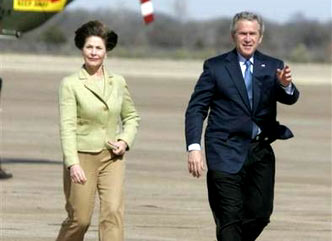|
Bush budget favoring defense, security
(AP)
Updated: 2006-02-06 09:43
US President Bush's 2007 budget proposes spending more
than $2.7 trillion, showering big increases on defense and homeland security and
a smattering of other favored programs such as scientific research, education
and energy.

President Bush and
first lady Laura Bush, left, walk across the runway before boarding Air
Force One prior to their departure for Washington, Sunday, Feb. 5, 2006 in
Waco, Texas. [AP] |
At the same time, Bush's blueprint being submitted to Congress on Monday
proposes shrinking or eliminating 141 programs while achieving $36 billion in
Medicare savings over the next five years.
The plan for the budget year that begins Oct. 1 lays out a path to achieving
two of the president's chief domestic goals: making permanent his first-term tax
cuts, which are set to expire after 2010, and cutting the deficit in half by
2009, the year Bush will leave office.
Details about the plan come from public statements, such as Bush's State of
the Union address last week, and interviews with officials familiar with the
budget proposal who spoke on condition of anonymity because they did not want
pre-empt the president's announcement Monday.
The budget's arrival on Capitol Hill will set off months of intense debate,
made even more contentious by congressional elections in November in which
Democrats want to wrest congressional control from the Republicans.
While Congress is expected to reshape Bush's proposals significantly,
Republicans voiced support for the blueprint's objectives.
"The American people know that our government's too big and it spends too
much. And they expect Congress to do something about it," newly elected House
Majority Leader John Boehner, R-Ohio, said on NBC's "Meet the Press."
Senate Budget Committee Chairman Judd Gregg, R-N.H., said that the
administration's proposal to trim Medicare was a "toe in the water" in the
effort to get the soaring costs of benefit programs like Social Security and
Medicare under control before 78 million baby boomers begin to retire.
"The big issue is entitlement reform and the fact that they are proceeding in
that direction is a good thing to hear," he said.
Democrats sought to portray Bush's budget as an election-year campaign
document rather than an honest effort to deal with exploding deficits.
The budget proposal's release comes only weeks before the national debt will
hit the current limit of $8.18 trillion, requiring Congress to vote for an
increase to keep the government operating.
"This budget is just detached from reality. The debt is exploding and the
president isn't facing up to it," Sen. Kent Conrad (news, bio, voting record) of
North Dakota, the top Democrat on the Senate Budget Committee, said in an
interview Sunday.
The administration has said the deficit for this year will top $400 billion,
compared with last year's $319 billion. The costs of fighting in Iraq and
rebuilding the hurricane-ravaged Gulf Coast have pushed government spending
higher than anticipated.
The administration said last week that it would submit a supplemental
spending request for an additional $18 billion for hurricane relief for the
current budget year, bringing total spending in response to the storms to more
than $100 billion.
|